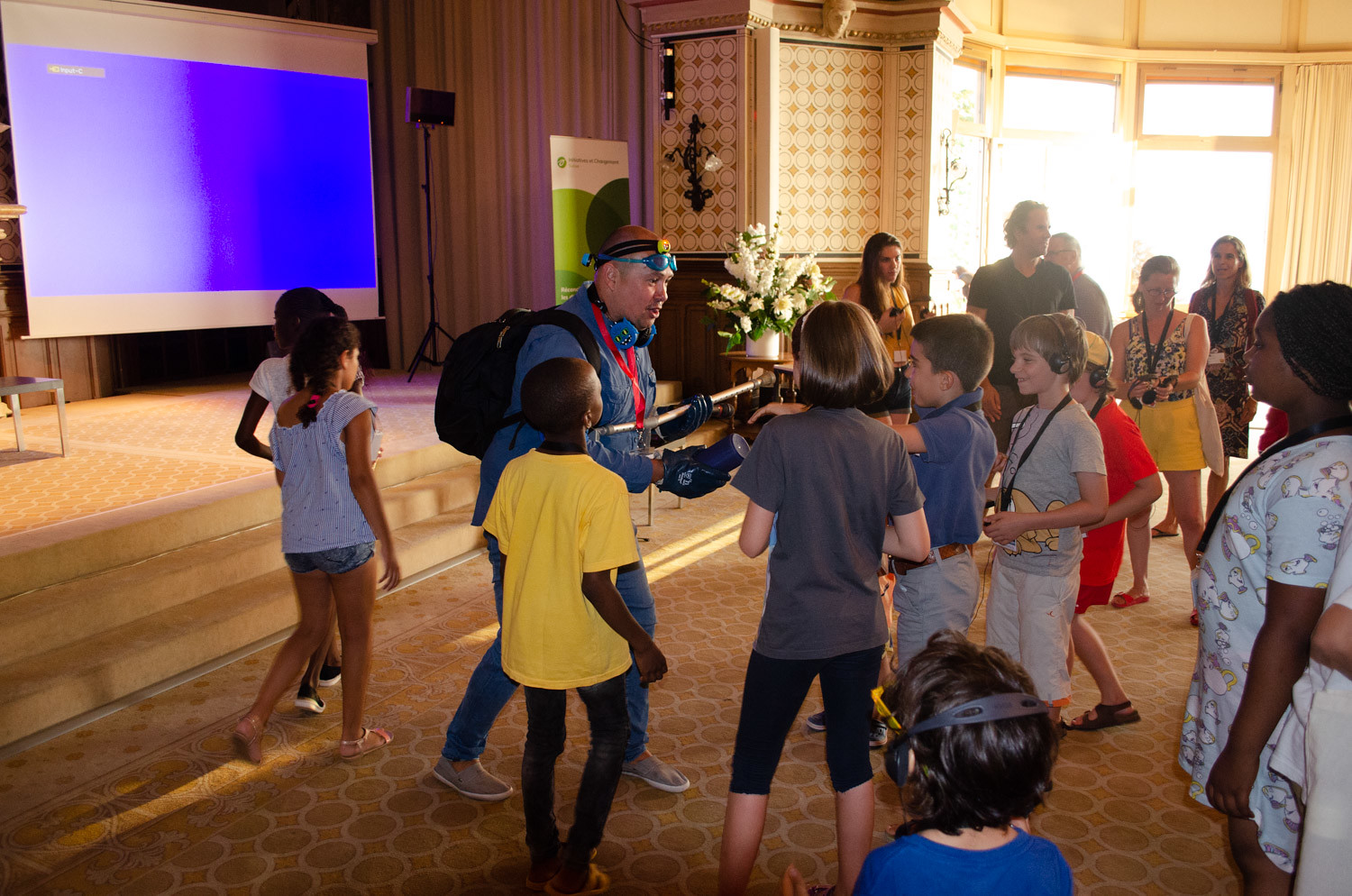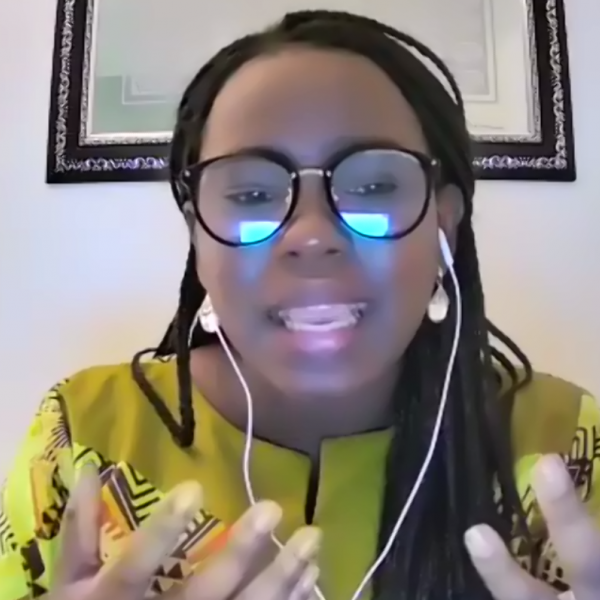‘Indigenous people have a gift to give to non-indigenous people: to teach them how to connect back to who they are’
CATS 2018: An interview with Shawn Andrews
04/08/2018
Shawn Andrews, an indigenous Australian, has created Indigicate, which teaches Australian school children about Aboriginal culture. Indigicate training isn’t held in classrooms, but outdoors. We met with Shawn when he was holding an outdoor morning session at the CATS forum.
Tell us about the Indigicate concept.
The only reason I get out of bed every morning is to stop our people from dying ten years younger than the average life-expectancy in Australia. The only way to achieve that is by changing a generation of young people. And the easiest environment for us to do that in is the outdoors, as it allows us to take a look at our country through our own eyes, and also to be exposed to our capacity for well-being and connection. It’s not always easy to take people out of the city, but Indigicate specializes in safe journeys in the outdoors, combined with indigenous culture connection. It has existed for six years so far. We have taught more than 40,000 students in our programmes in the last three years and worked with over 50 schools. Only now are we beginning the see the results.
Do you get any support from the state or is it entirely privately funded?
I was taught a long time ago that the only way to have change with a longterm impact is to create a sustainable business which is not dependent on government. So we developed a product that schools would want to utilize. Schools in Australia already go out on school camps every year from year 3 to 10. We figured out that if we could compete in that space, as outdoor educators with a product that could help us change the world, then schools would pay for it independently and we wouldn’t need to rely on government assistance.
What is the reception you get from the kids? Are non-indigenous kids in Australia open to learning about Aboriginal culture?
Absolutely. People in Australia sometimes think indigenous culture is only about boomerangs and digeridoos, but it’s much richer and deeper than that. We get letters from parents saying how wonderful the programmes are and how the young people have changed. The process we use is more than just giving them information about culture and history. It’s about changing the person, understanding how we can connect. The response has been truly amazing. We are sitting now in the position where our organization could very quickly grow to 30 or 40 staff, with 20,000 students per year just on camps. The young people today are so inquisitive, so passionate. They want change and they want a voice and we give them a platform to do that. They just love the idea that we are not different, that we should all just be together. So the timing is very right for me.
In which area of Australia do you focus?
Currently we are based in Melbourne, but we also work in other states and areas.
When you begin this kind of business, you don’t want to grow too quick and outgrow your expertise, because then you deliver a product that’s not up to standard and you can’t change a generation if you are not working efficiently in schools. But our longterm aim is to be national and even international. We already do some work around the world. I think indigenous people around the world have a gift to give to non-indigenous people: it’s to teach them how to connect back to who they are.
How did you start your relationship with Caux and IofC?
I attended the APYC (IofC Asia-Pacific Youth Conference) in 2007. Back then I had a lot of problems in my life, I was still a very unsettled individual. A few people in IofC Australia started having conversations with me on how I could look at life a little bit differently. At the same time, I gave a speech at a prestigious school in Melbourne and some of the people there were also involved in IofC. They offered me a fully funded trip to Caux, to participate in the equivalent of the Caux Peace and Leadership Programme. So I came and participated in the 2009 course.
That was my first ever trip overseas as a 28-year-old, and I was the first person in my family to travel overseas. Of course, the first thing that you see here in Caux is the natural beauty, but then I connected with the place. The souls and spirits of the building, the land and the people here had a great impact on me.
But it took me four more years to get rid of my gambling addiction, depression and anxiety, and start Indigicate, which I started with 20 dollars. The inspiration for it came from two places. It came from the mountains back at home that used to sort of talk to me and it came from the strength and wisdom of the people, and especially the elders, of Caux who had the ability to read me very well and give me the right advice.
And then I was back here only last year for CATS, because I truly believe in this conference. I truly believe in young people’s voices being promoted, and I want to bring some of our kids next year.
So you have some plans for future projects between CATS, Caux and Indigicate?
Yes. To bring indigenous kids in care here, we must probably get government funding or raise funds, because to bring someone here from Australia costs a lot of money. We are starting to work with better government alliances and we want to bring 10 to 12 young Australians. Half will be kids in care from trauma situations and half will be indigenous kids from some of the schools we work with. We already have a couple of them here this year.
The whole idea is that when these kids go home they can be the spark for the rest of the young people they hang out with. So they can have an impact. I see myself as just a single drop of water in what will hopefully become a magnificent waterfall of change in our country.
Kids in indigenous communities in Australia face a lot of challenges, right?
Yeah! Our kids are struggling. Not all of them, though, as there is a bit of a gap between well-off kids and kids who are living in poverty within our own communities. There still is a lot of suffering. We Aborigines hold a lot of records that we shouldn’t hold – like the highest rate of youth incarceration in the world per population and the highest rate of youth suicides. Ten years ago we made up 5% of all youth suicides in Australia and we now make up 80%, while we are only 3% of the population. And unfortunately around 30% of indigenous kids in my state alone (Victoria) live in the care of the government. It’s a tragedy because we are essentially creating more people who will be in that system and then they will have kids who will stay in that system. So we have to try our hardest to show them that there is hope and love and kindness in the world and that they will be OK, that they can achieve something.
If we get enough indigenous kids to do this, in three or four years’ time we will have a CATS in Australia, led by them. This would be the seed of change to stop our people dying and hopefully change the situation. But also one of the aims is to focus on the non-indigenous kids, because they are the greater part of the population and so will be able to have a larger impact in business or in politics in the future.
By Félix Portier, 2018 Caux Forum Communications Intern































